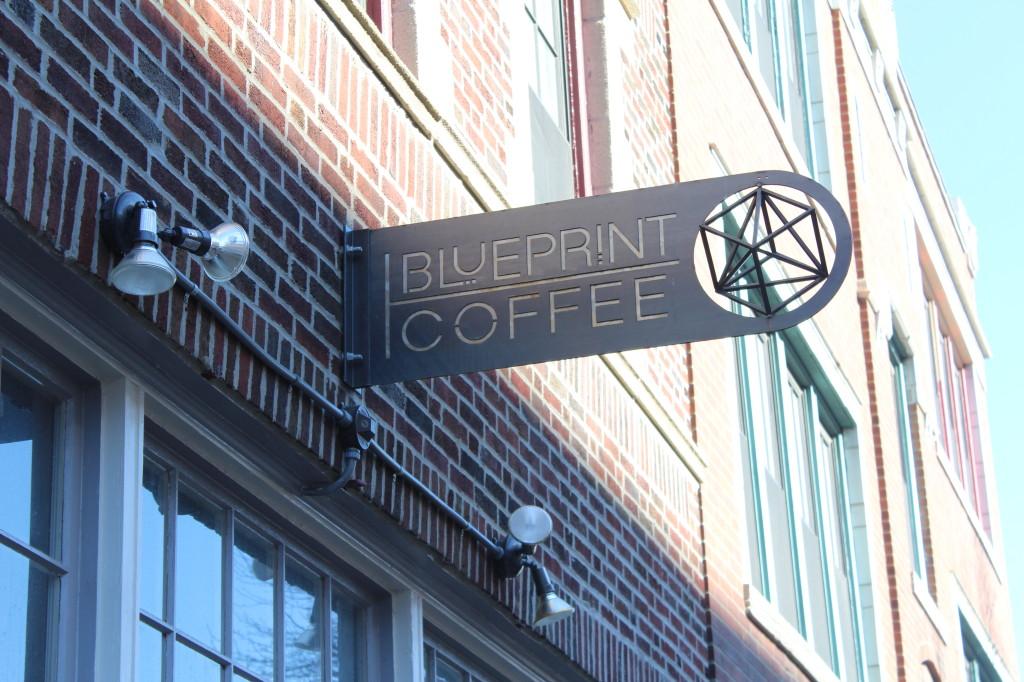It’s All In The Beans
March 12, 2014
The Delmar Loop gained a new gathering place late last year when Blueprint Coffee opened its doors to a St. Louis audience accustomed to artisan bean purveyors like Kaldi’s and reliable corporate giants like Starbucks.  When asked how the name “Blueprint†came to be, CHS alum and co-owner of the cafe, Mazi Razani, explained his concept:
“[The name] kind of mirrored how we make our coffee,†said Razani.  “It’s detailed, and we pay attention to every aspect of it. It’s almost scientific, really.â€
Razani graduated from CHS in 2005, and attended Mizzou. His fascination with coffee began when he worked at Kayak’s alongside his brother as a barista in the summer. Razani got a job as a bank teller after graduating from college, but he missed the hands-on work of brewing coffee. After only a year of working at a bank, he decided to apply for jobs at coffee shops. Razani worked at Kayak’s for two and a half years, until he and five friends decided to open up a coffee shop of their own.
   Razani has always aspired to have a business of his own. “The thought of not having a boss is obviously a wonderful idea,†Razani said. “Blueprint was a unique opportunity to open up a place that St. Louis didn’t already have.â€
Unlike Starbucks and Kaldi’s, Blueprint is one of the few places in St. Louis where they hand-brew their coffee. The coffee beans are ground and brewed to order. Starbucks and Kaldi’s brew pots of coffee and serve it straight from the dispenser.
Blueprint has a coffee bean roaster in the back of their shop, where they roast their beans in-house.
“We are an independent shop so we can buy the higher-grade coffee in smaller lots and be able to highlight specific coffees that are really good,†said Razani.
The roasting process brings out the natural flavors of the coffee. Blueprint buys a higher quality bean, so they have complete control over the roasting process. Â This means that they can apply a light roast so that the natural flavors of the coffee bean shines through.
Angelino Abad #1 and Karimukui AA Top are just some of the types of coffee Blueprint sells. They rotate their coffees four or five times a year. Razani’s favorite coffee is brewed from Ethiopian beans that Blueprint had in their first batch.
To the baristas at Blueprint, making coffee is an art form. The top shelf of a bookcase in their shop sports an array of trophies and plaques from barista competitions. Some of the categories include espresso-making and hand-brewing.  Later this spring, Razani and the other co-owners of Blueprint will be looking to add one more piece of hardware when they head to Seattle in April, to compete for nationals. “The barista competition is pretty organized and it’s been going on for a while, so [the process has] been refined,†said Razani.
Razani is no stranger to competition.  He played on the Clayton football team that won the state championship in 2004. “It had been the first time the [CHS] football team had reached state, and the first time we had won, so that was a really unique experience,†Razani said.
In addition to football, Razani also played lacrosse at CHS and loved the sport so much that he continued with club lacrosse at Mizzou.
This dedication to a pursuit is evident today when Razani talks about the process of cultivating and brewing coffee.
“These days, I’m more aware of how the process [of coffee-making] works.  A lot of it has to do with the fact that coffee is a crop and people’s livelihoods–even countries–depend on this kind of stuff,†Razani said. “It gets really interesting when you get to the social aspect of it. A lot of farmers put in a lot of time and hard work, and to be able to highlight that hard work is really gratifying.â€
When patrons of Blueprint take a sip of their fresh brewed cup of joe, there’s no doubt they too are tasting the hard work of Razani and his crew.



![“[The] biggest obstacle right now is getting up early. I'm still getting back into the school mode, and usually I'm the type of person who wakes up a minute before my alarm. But right now, that is definitely not happening.” -Anna Hormberg, History teacher](https://www.chsglobe.com/wp-content/uploads/2025/09/image3-2-1200x900.jpg)



![“I love working with students, that's why I decided on being a high school teacher. I was going to go the University route, but it's a different feel[ing]. Working with students is what makes it fun, keeps it alive, keeps me, trying to connect with students about my passion with ancient Rome and Greece and how they overlap, and how the stuff we do in class impacts their lives. That's kind of the goal I have, is having them see themselves, students in this larger scope of history from 2000 years ago, and how you're part of that now. ”
- Matthew Crutchfield, CHS Latin teacher](https://www.chsglobe.com/wp-content/uploads/2025/09/image2-3-e1757531718144-1200x872.jpg)
!["It's really hard to make friends in Clayton high school if you're a newcomer. Everybody already knows each other, and they have established friendships for many years. My goal is always to make my space a safe one for them to take risks, [and] relax." Nancy Gamble, English Language Specialist](https://www.chsglobe.com/wp-content/uploads/2025/09/image1-e1757625469759-1200x843.png)
